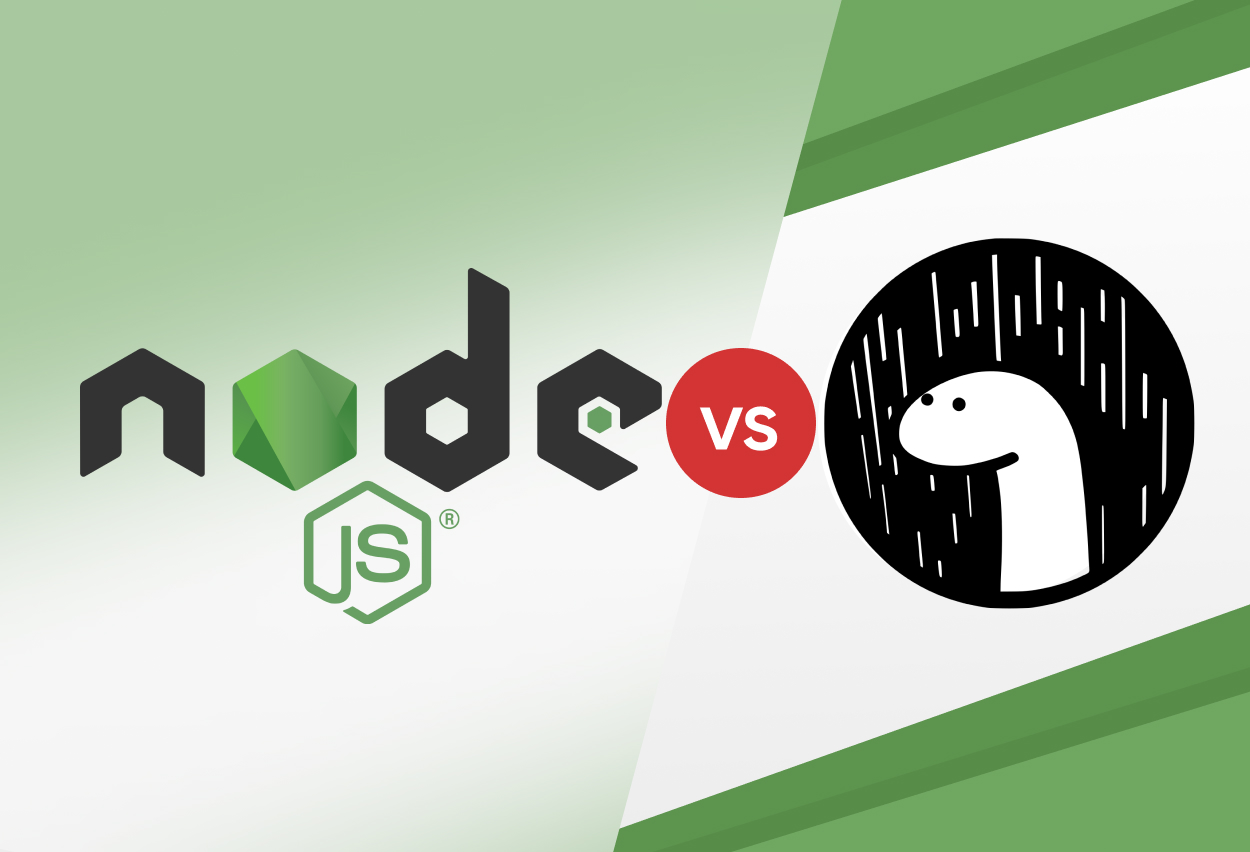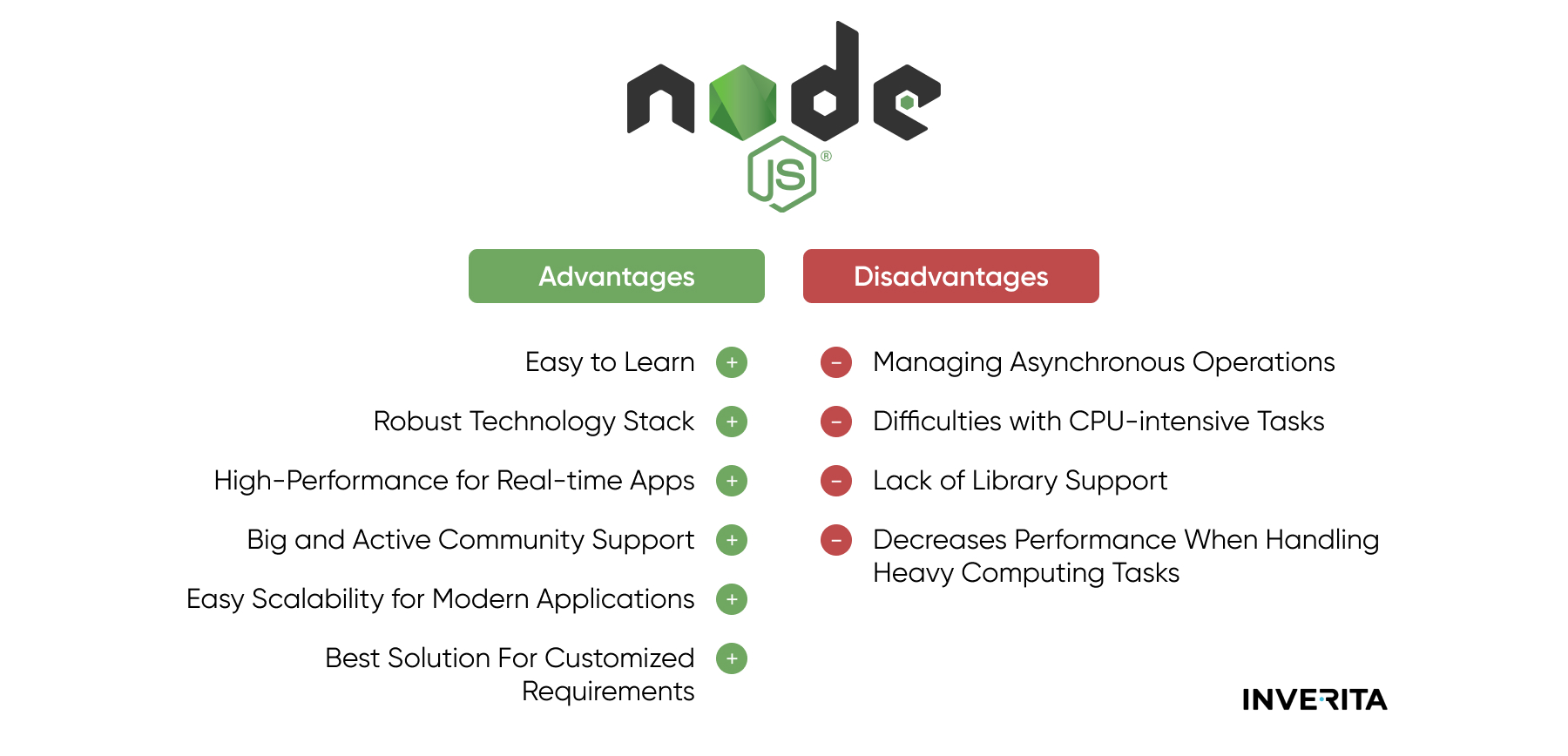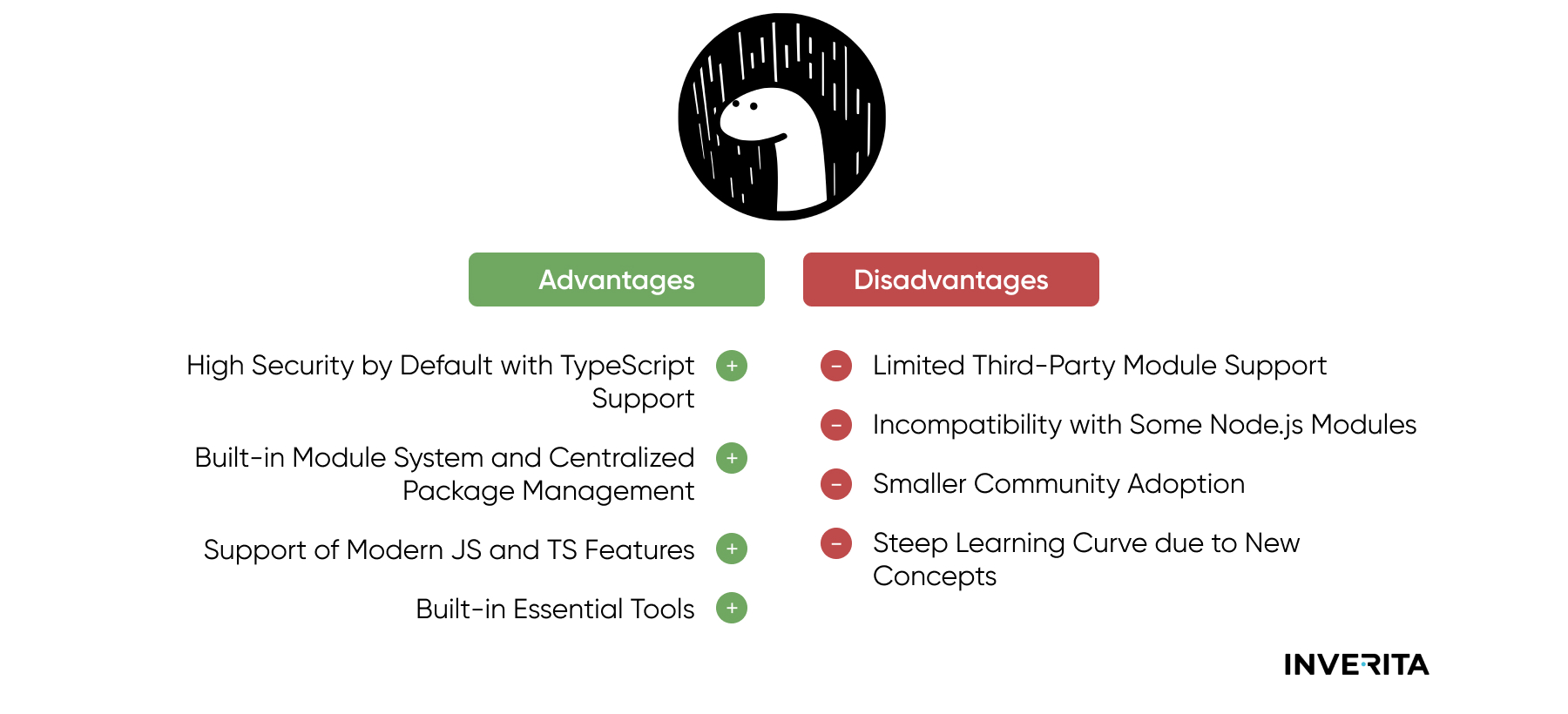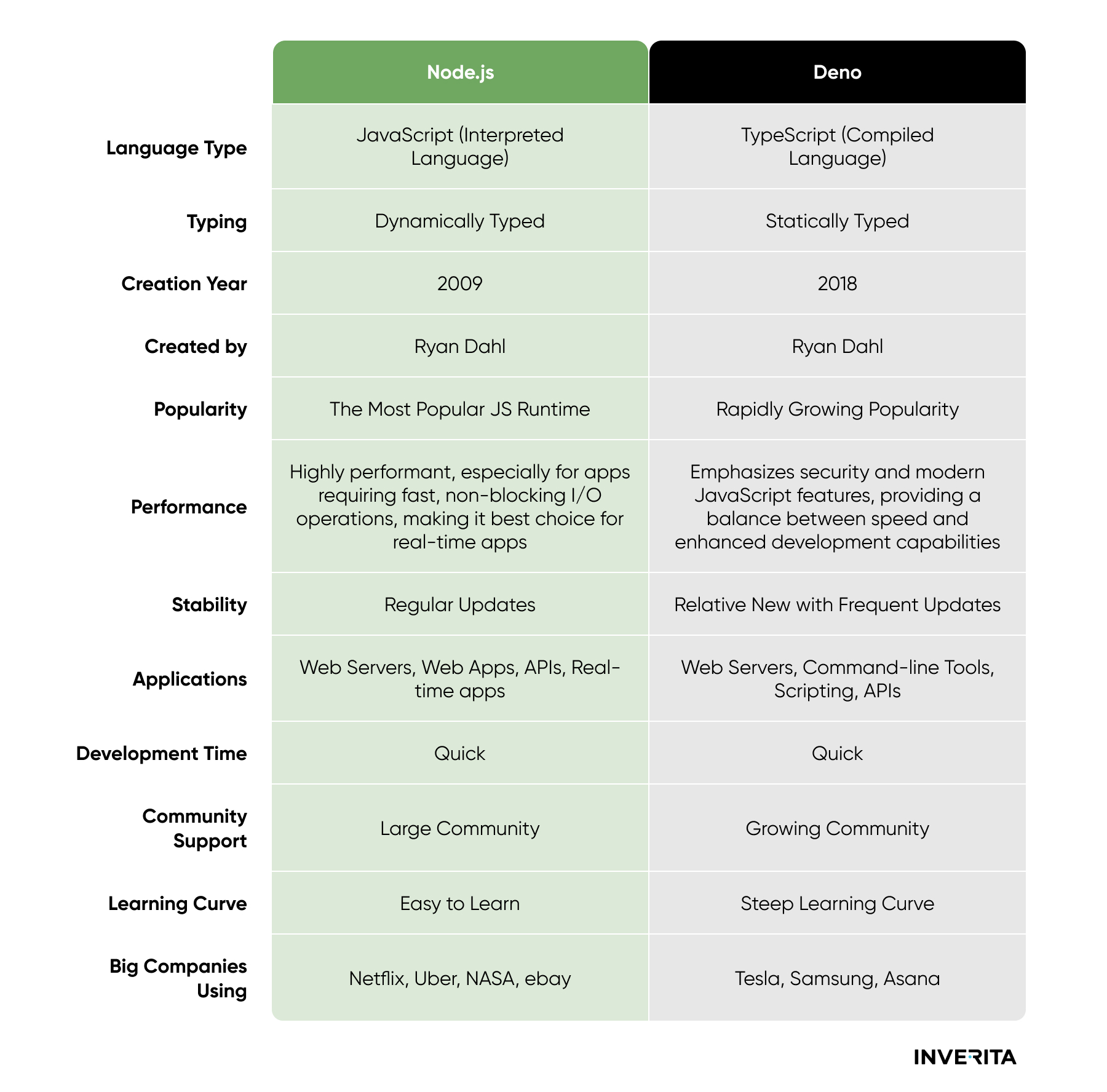Deno vs Node.js: How They Differ
Now, let’s look at the difference between Nodejs and Deno.
Security
The main reason why Ryan Dahl created Deno was security. While Node.js works without sandboxing and doesn’t ask for permission to read or write files, Deno runs code in a secure sandbox, restricting file system access. It requests permission before interacting with system resources (network, file systems, etc.) which makes it less vulnerable to attacks.
Module System
In Node.js, modules are imported using the require() function for CommonJS modules and import() for ECMAScript modules. Node.js modules often rely on the CommonJS style, but the introduction of ECMAScript modules provides an alternative way to handle imports.
In Deno, the module system is more flexible and unique. File names must be specified in full, and there is no special handling of index.js files. Deno imports third-party dependencies by specifying a URL in an import statement. For example, in Deno, you can directly import a module from a URL like this:
import { someFunction } from "https://example.com/some-module.ts";
This approach allows Deno to load modules from various sources, including its CDN, GitHub, or any valid URL, providing a decentralized and dynamic module resolution system. However, this method can appear unconventional compared to traditional package management systems. To address this, Deno recommends creating a central deps.ts file, similar to Node.js's package.json, where external libraries are imported and re-exported for consistent usage across projects. This unique approach showcases Deno's flexibility and adaptability in handling module dependencies.
TypeScript Support
Deno provides seamless native support for TypeScript, enabling users to write and run TypeScript code directly without any additional tools or plugins. This integrated feature eliminates the need for a separate build process, saving time and effort and allowing developers to concentrate on coding.
In contrast, while TypeScript can be used in Node.js applications, it demands extra tooling and setup. Installing the compiler and configuring a build pipeline can be complex and time-consuming, especially for beginners. Additionally, updates to the compiler might necessitate alterations to the build pipeline, potentially leading to maintenance challenges.
Deno, with its built-in TypeScript capabilities and simplified setup, offers a more streamlined and developer-friendly experience for those who prefer TypeScript.
Standard Library
Node.js boasts a mature standard library tailored for server-side applications, offering modules for file system operations, networking, and HTTP handling. Accessed through the require() function, Node.js modules adhere to the CommonJS module system. However, Node.js lacks a built-in package manager for its standard library, relying on external tools like npm for third-party packages.
In contrast, Deno's standard library is designed with modern JavaScript and TypeScript features, embracing ES modules natively and supporting decentralized module loading. Deno's modules, accessible directly from URLs, prioritize security by default. Deno also includes essential tools like a linter, formatter, and testing library, ensuring consistent APIs and code quality.
Despite Deno's strengths, its ecosystem is still evolving, potentially requiring custom development for advanced features. Node.js, with its evolving APIs, faces similar challenges, necessitating third-party libraries and tools that can lead to functional inconsistencies. Developers in both ecosystems must balance these considerations for optimal functionality and consistency in their applications.
Tooling
Node.js has a mature tooling ecosystem, including robust modern frameworks like Express.js and popular build tools like npm registry and yarn. Additionally, it benefits from extensive IDE support and debugging tools.
Deno, being relatively new, offers built-in tools for formatting, linting, and testing, reducing the reliance on external packages. While its tooling is growing, it might not match Node.js's extensive variety yet.
Compatibility
Node.js has widespread compatibility with existing npm packages and libraries, making it suitable for a wide range of projects. However, managing dependencies and ensuring compatibility across different versions can be a challenge due to npm's evolving ecosystem.
Deno, while not directly compatible with Node.js modules, encourages a more modern approach with ES modules and direct URL imports. Its compatibility is evolving, and developers might face challenges when migrating existing Node.js projects to Deno, especially if they heavily rely on specific Node.js packages.
Comparison of Node.js vs Deno
Let’s compare Nodejs vs Deno in terms of performance, scalability, community support, and learning curve.
Performance
Node.js is known for its excellent performance, particularly in I/O-bound and event-driven applications. Its non-blocking architecture and event loop enable handling multiple connections simultaneously, making it suitable for real-time applications.
Node.js's exceptional performance led major tech companies to embrace the technology. For instance, PayPal's adoption of Node.js resulted in a significant 35% reduction in average response time, enabling the company to deliver quicker and more efficient services to users.
Deno, while performant, offers a balance between speed and enhanced development capabilities. It includes modern JavaScript features and emphasizes security, providing a secure environment. However, its performance might not surpass Node.js significantly in all scenarios.
Scalability
Node.js is highly scalable, capable of handling a large number of concurrent connections efficiently. Its event-driven, non-blocking nature allows developers to build scalable applications, making it popular for microservices architectures and real-time applications.
Deno shares similar scalability characteristics, ensuring applications can handle concurrent connections effectively. Its focus on security and modern JavaScript practices does not compromise its ability to scale, making it suitable for scalable applications as well.
Community Support
Comparing Nodejs vs Deno community support is relatively easy, as Node.js is twice older than Deno.
Node.js has a large, mature, and active community that has been growing for years. It offers extensive resources, forums, tutorials, and third-party packages through npm, making problem-solving more accessible.
Deno, although growing rapidly, has a smaller community in comparison. While it's enthusiastic and innovative, the ecosystem might not be as extensive or well-established as Node.js.
Learning Curve
Node.js, being older and more established, has a wealth of resources and tutorials tailored for beginners, making it relatively easier for developers to learn. Its documentation is extensive and widely used, providing a smooth learning experience.
Deno, being newer, has a learning curve associated with its unique features like URL-based imports and secure defaults. Developers accustomed to traditional package managers might need some time to adjust. However, Deno's simplicity and modern JavaScript features can also make the learning curve more straightforward for some developers.
Node.js vs Deno: Make Your Choice









